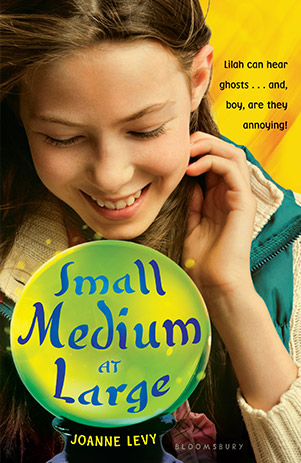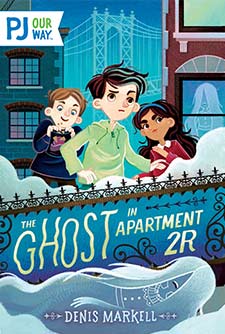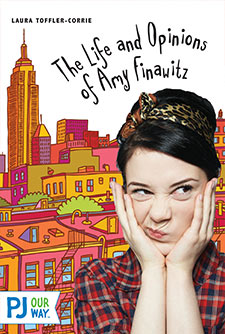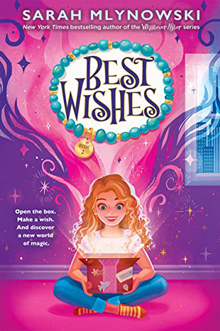Small Medium at Large
Lilah hears ghosts. They aren't scary, but they sure do like to give her advice. Sometimes this can cause more harm than good!
Average Rating
( hint: Login to leave a review! )
243 Reviews
Leave Review
What the Book is About
Jewish Content & Values
Positive Role Models
Content Advisory
Talk it Over!
More for You
What the Book is About
Being struck by lightning leaves seventh grader Lilah able to communicate with the dead, and life gets pretty interesting when she starts delivering messages from the great beyond. Will the deceased Mr. Finkel be able to help Lilah with her huge crush on his son, Andrew? Can Bubby Dora help Lilah’s lonely father find a new wife? This is a lighthearted coming-of-age book with a fun, supernatural twist.
Jewish Content & Values
- This book takes place within a Jewish context: Lilah and her friends discuss their upcoming B'nai Mitzvah (Jewish coming-of-age ceremonies); Lilah mentions attending synagogue; a rabbi officiates at Lilah’s mother’s second wedding; and Lilah’s bubby (Yiddish for grandmother) is one of the advice-giving ghosts.
- Tikkun olam (repairing the world): Lilah uses her new psychic powers to help her school crush, Andrew, talk to his deceased father; to help her music teacher, Mr. Robertson, get inspiration from his dead girlfriend; and to help a bully named Dolly, who later becomes a friend, make her charity fashion show a smashing success.
- Teshuvah (repentance): Lilah wants to get back at Dolly for not inviting her to the eighth-grade fashion show, but when a mischievous ghost complies with Lilah’s wishes and threatens to ruin all of Dolly’s hard work, Lilah repents of her actions and helps Dolly with the show.
Positive Role Models
Lilah is strong, self-confident, and kind. Getting hit by lightning and hearing ghosts does not faze her, and she quickly puts her new skills to good use by helping those around her. She refuses to make money by telling people's futures or by haunting people. She even uses her powers to help Dolly, who initially teased her.
Content Advisory
Lilah talks to dead people: a boy who died from leukemia, a woman who died from cancer, and others, like her bubby, who died from old age. Pre-teen language such as “he’s hot” and “hottie,” and pre-teen themes such as developing breasts, having crushes, and first kisses, are explored. At one point, Lilah goes bra shopping for the first time; her crush, Andrew, sees her and she is mortified.
Talk it Over!
Lilah helps people talk to their deceased loved ones, but she is very clear that she does not want to use her power to haunt or hurt. Would you want to be able to hear ghosts like Lilah can? Why or why not? Do you think Lilah would have chosen this power had she been given a choice?
More for You
Tikkun olam is a phrase that is used today to mean creating positive social change. However, the original concept of tikkun olam comes from kabbalah (Jewish mysticism). In a mystical story from the 16th century, God creates the world by pouring divine light into numerous vessels. The vessels, however, cannot hold the light. They break, the pieces scatter, and God’s original masterpiece is lost. But with this loss of perfection, a chance for tikkun olam is born. Human beings, acting b’tzelem elokim (in the image of God), are asked to put the world back together by bringing out the divine spark that is inside each of us. In this way, we restore the world to wholeness.
What the Book is About
What the Book is About
Being struck by lightning leaves seventh grader Lilah able to communicate with the dead, and life gets pretty interesting when she starts delivering messages from the great beyond. Will the deceased Mr. Finkel be able to help Lilah with her huge crush on his son, Andrew? Can Bubby Dora help Lilah’s lonely father find a new wife? This is a lighthearted coming-of-age book with a fun, supernatural twist.
Jewish Content & Values
Jewish Content & Values
- This book takes place within a Jewish context: Lilah and her friends discuss their upcoming B'nai Mitzvah (Jewish coming-of-age ceremonies); Lilah mentions attending synagogue; a rabbi officiates at Lilah’s mother’s second wedding; and Lilah’s bubby (Yiddish for grandmother) is one of the advice-giving ghosts.
- Tikkun olam (repairing the world): Lilah uses her new psychic powers to help her school crush, Andrew, talk to his deceased father; to help her music teacher, Mr. Robertson, get inspiration from his dead girlfriend; and to help a bully named Dolly, who later becomes a friend, make her charity fashion show a smashing success.
- Teshuvah (repentance): Lilah wants to get back at Dolly for not inviting her to the eighth-grade fashion show, but when a mischievous ghost complies with Lilah’s wishes and threatens to ruin all of Dolly’s hard work, Lilah repents of her actions and helps Dolly with the show.
Positive Role Models
Positive Role Models
Lilah is strong, self-confident, and kind. Getting hit by lightning and hearing ghosts does not faze her, and she quickly puts her new skills to good use by helping those around her. She refuses to make money by telling people's futures or by haunting people. She even uses her powers to help Dolly, who initially teased her.
Content Advisory
Content Advisory
Lilah talks to dead people: a boy who died from leukemia, a woman who died from cancer, and others, like her bubby, who died from old age. Pre-teen language such as “he’s hot” and “hottie,” and pre-teen themes such as developing breasts, having crushes, and first kisses, are explored. At one point, Lilah goes bra shopping for the first time; her crush, Andrew, sees her and she is mortified.
Talk it Over!
Talk it Over!
Lilah helps people talk to their deceased loved ones, but she is very clear that she does not want to use her power to haunt or hurt. Would you want to be able to hear ghosts like Lilah can? Why or why not? Do you think Lilah would have chosen this power had she been given a choice?
More for You
More for You
Tikkun olam is a phrase that is used today to mean creating positive social change. However, the original concept of tikkun olam comes from kabbalah (Jewish mysticism). In a mystical story from the 16th century, God creates the world by pouring divine light into numerous vessels. The vessels, however, cannot hold the light. They break, the pieces scatter, and God’s original masterpiece is lost. But with this loss of perfection, a chance for tikkun olam is born. Human beings, acting b’tzelem elokim (in the image of God), are asked to put the world back together by bringing out the divine spark that is inside each of us. In this way, we restore the world to wholeness.





